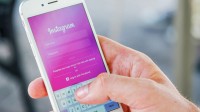Fake Followers on Instagram Are Becoming a Costly Problem
September 13, 2019
Fake followers are a problem on Instagram. A $1.3 billion problem, to be exact, due to the brands that are paying influencers whose followers simply don’t exist. It’s gotten easier to buy fake followers, from dozens of online sellers and a coin-operated vending machine from artist Dries Depoorter. Cybersecurity firm Cheq tallied the monetary cost above to brands for 2019 alone. Now, potential sponsors and agencies are increasingly up in arms about the scam, and looking for ways to hold influencers responsible.
Wired reports that Gabrielle Vogt, senior manager of digital talent at HelloSociety, an influencer marketing agency, stated the ban on fake followers is now spelled out in contracts. “They have to agree that they haven’t participated in comment pods, botting, or purchasing fake followers,” she said.

Comment pods (also called engagement pods) are when influencers “agree to like and comment on each other’s posts to artificially drive up engagement and improve their algorithmic performance.” Botting refers to automated fake accounts, but Wired points out that, now, fake followers are “often real people, just not always the person they say they are, and, of course, not someone who is an actual fan (and hence, potential customer).”
HelloSociety and its ilk also use software tools such as Social Audit Pro, IG Audit, HYPR, HypeAuditor and Famoid, to “sniff out counterfeit or fraudulent accounts.” The tools look for “deviations from the platform’s norms,” which can take many forms although “fake followers are getting much harder to identify.”
IG Audit creator Andrew Hogue described one telltale sign. “A year ago, I would see influencers buy one to 10,000 followers at a time, and it would show up on a graph as a giant jump out of nowhere,” he said. But lately, sellers of fake followers offer “drip” arrivals that arrive in batches of 50 or so, over 600 days. “Normal users will have a smooth logarithmic slope,” he says. “If you’ll see a jagged, stair-like pattern out of nowhere, that’s fraud.”
These anti-fraud tools are now in the spotlight. “I’ve never paid a cent for marketing,” said Social Audio Pro creator Robert Harris. “It went viral on its own.” IG Audit was used by the Institute of Contemporary Music Performance to examine 100 of the “most successful” Instagram accounts. The verdict was that up to half of all of those following Ellen DeGeneres, Korean boy band BTS, Kourtney Kardashian, soccer player Neymar, Ariana Grande, and Taylor Swift were fake.
Wired opines that “Instagram’s plan to hide likes is unlikely to change the platform’s reward system enough to discourage this behavior … [because] fake followers predate Instagram, and will likely survive it.”
No one knows that better than Harris, who created the “audience-inflating MySpace bot” dubbed Friend Blaster Pro years ago, to his current dismay. “Lucrative businesses that solve a perceived social issue and very real financial problem are hard to kill,” notes Wired.

No Comments Yet
You can be the first to comment!
Sorry, comments for this entry are closed at this time.